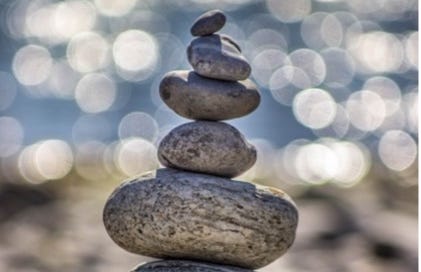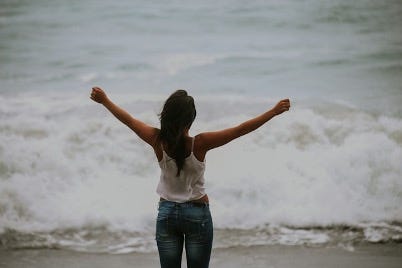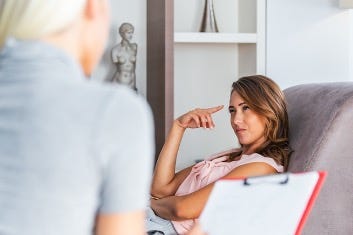Are you your own boss, with full control of your body and your health? Or is your doctor? Or your health insurance company, or the malpractice lawyers lurking in the background? They all have your health in their interest – just maybe not always in your best interest.
I do everything I can to not hand my health over to someone else. I see my primary care doctor as a guide, someone who can answer medical questions that I don’t know the answers to or can’t find with a google search. I see her as an advocate for me, not a superior dictating how things are going to go. Her suggestions for what might help me? Ok, that’s good. When I get sick, I may need more medical help … or not. It’s up to me to decide.
Recently I went to my doctor with some very high blood pressure readings that I found out about when I donated blood. I kind of freaked because a couple of people I knew had recently had strokes, and I didn’t want that happening to me. The fear of what could or might happen drove my blood pressure even higher. My doctor, who takes a holistic approach to health, didn’t want to jump to medications and instead we worked together to come up with alternative ways to handle my blood pressure. That’s my idea of how I want my health care to work.
In times of illness, many people hit the default button of reaching out to traditional western medicine with its quick fix medications and treatment regimens without addressing the root cause of the illness. For some people this works. They figure the doctor has been trained in areas that they have not, so why not completely enlist in their care. But sometimes western medicine gets it wrong. Or sometimes it imposes itself on our ability to know what’s best for us. There’s a fine line here - between keeping your power as your own, intuitive advocate, and deferring to the specialists who know more about life threatening illnesses than you do.
When it comes to maintaining or improving my health, I like to believe I have control – over how much I move or exercise; what, when, and how I eat; and making conscious decisions on how I manage my stress. I also consider other alternative health therapies, such as acupuncture, herbal medicine, ayurvedic medicine, craniosacral therapy, yoga, massage, and sound healing to name a few.
But what about my genetics that say I’m predestined to have heart problems, high cholesterol, dementia, diabetes? Yes, genetics do dictate part of our health now and in the future. But there is something called epigenetics - factors on top of our genetic code that influence our health and whether those genes will be turned on and activated to create illness – or not. Lifestyle is one of the most influential factors in epigenetics. You probably know what lifestyle refers to - things like diet, smoking, alcohol, drugs, exercise, sleep, environment, and stress, among a host of other factors.
Through epigenetics we can affect the quality and longevity of our lives. It’s called disease prevention. There are areas in the world where the population lives well into their 90’s,100’s and beyond, with a positive quality of life. These are called blue zones and are in Okinawa Japan, Sardinia Italy, Nicoya Costa Rica, Ikaria Greece, and Loma Linda California.
Factors that make them blue:
1. Physical activity that is intentional and enjoyable. Gardening, walking to the store, biking to a friend’s house, walking the dog, things that you can add to your daily routine without using your car. I don’t think the blue zones factor in gym memberships, unless maybe you just love the gym.
2. Social Connection – the feeling of belonging to a group of like-minded people - a group of people who watch out for and take care of each other. It could be family, or it could be a church, a neighborhood, a mom’s group, or even just your best friend.
3. Healthy, purposeful outlook – having purpose now. Having a purpose each day is part of blue zone living. There is less importance on struggling to accomplish something for the future and more importance on enjoying your work or life now.
4. Spirituality – whether its religion or a simple belief system that we are part of something bigger, more universal.
5. A plant-based diet, eating mindfully (not just shoveling in the food so you can move onto your next activity), and following the 80% rule - once they’re 80% full they stop eating. I find that during a meal, there comes a time that, unconsciously, I put my fork down and take a break from eating – it happens naturally. That is my body telling me it’s received all it needs and to stop eating now.
6. Moderate alcohol intake
I would add a #7 - techniques to reduce stress, such as mindfulness and meditation. More on that later.
These are lifestyles proven to promote quality longevity. Western medicine is beginning to catch on, though in my experience most doctors don’t spend time in educating their patients on how best to prevent illness. Quite honestly (and cynically) it’s too easy to prescribe a medication. There’s a pill for everything, and the pharmaceuticals are running part of this country. The idea that food is medicine is for the liberal thinkers and not realistic. The thought that taking time out of a busy day to meditate or walk in nature for thirty minutes is stealing time from job productivity.
Back to our control over our own health. There are times when we need the emergency room to treat a stroke, or heart attack, or ruptured appendix. We need doctors available for mental health intervention for an acute mental or emotional break. And sometimes we need that medication that is going to save our life or our sanity. But beyond that, we can, and should, consider all the options in how we are going to prevent illness. And should we become sick, whether it’s the flu, cancer, or a mental health challenge how will we choose to recover? Western medicine or eastern medicine? Nontraditional or alternative? Or a blend of all of them? That is the art of medicine
.







Great article, Julie. You raise many important points.
When traveling to China in the early 90s, I got dysentery. It was terrifying to be so sick in a foreign country, far from Western medicine. Our hosts gave me a “pill”: an egg-sized ball of dirt, which they told me to put in hot water to make a kind of tea. It tasted like earth. And… I got better within hours! This experience opened my eyes. Had I taken antibiotics, it would have been ages before I got better.
Though Western medicine saved my husband’s life, the cocktail of two dozen drugs is a nightmare to juggle and often leaves him feeling worse. I am skeptical of the drugs-and-surgery approach. Instead, I believe “food is medicine” and the body has deep wisdom to rebalance and heal itself with the diets you mention.
Thank you for raising this issue.